Sep 2019 2nd Edition
Sep 2019 2nd Edition vuyelwan
Translations
2020 NSFAS online applications open
2020 NSFAS online applications open UrsulaStudents hoping to get funding from the National Student Financial Aid Scheme for 2020 only have until 30 November to apply. 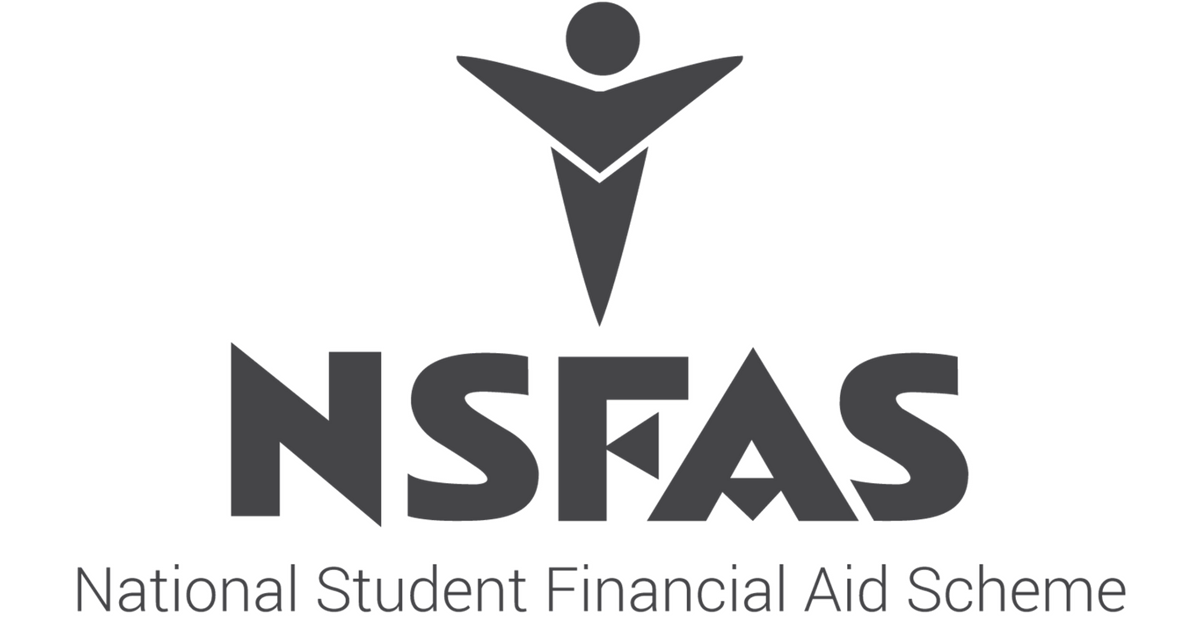
The National Student Financial Aid Scheme (NSFAS) has opened online applications for funding for the 2020 academic year.
This is according to the Minister of Higher Education, Science and Technology, Blade Nzimande, who briefed media in Pretoria recently.
The Minister said online applications opened on 1 September and will close at midnight on 30 November.
NSFAS provides funding for students from poor and working-class backgrounds to study at technical and vocational education and training (TVET) colleges and universities.
Government has set aside over R80 billion for the next three years to ensure that these students, who have a combined household income of less than R350 000 per annum, have access to higher education and training.
 “University NSFAS-qualifying students are funded for their first undergraduate qualification,” the Minister clarified.
“University NSFAS-qualifying students are funded for their first undergraduate qualification,” the Minister clarified.
He said that so far this year, NSFAS has funded nearly 600 000 students at TVET colleges and universities.
“It should be noted that Term 2 and Term 3 registrations are ongoing. In 2019, NSFAS funded close to 45 percent of the undergraduate student population at our public universities,” he said.
The Minister added that the department’s cohort studies have shown that NSFAS students, on average, perform significantly better than students in the overall population.
“It is gratifying to note that [when] comparing the 2008 cohort of university students, who received NSFAS funding, with the general cohort of undergraduate students starting in that year, the NSFAS cohort out-performed the national cohort by more than ten percent, including contact and distance students,” the Minister said.
“I am proud that we are making a crucial difference in the lives of young people from poor and working-class backgrounds,” he added.
NSFAS qualifying criteria
To be eligible for NSFAS funding for university and TVET college studies, applicants should meet the following criteria:
- Be a South African citizen.
- Intend to enrol at any of the 26 public universities or 50 TVET colleges in 2020.
- Come from a family with a combined annual household income of not more than R350 000 per annum.
- If you are a student with a disability, your family income must not be more than R600 000 per annum.
Agree to the terms and conditions of the NSFAS grant or bursary awarded.
The Minister said that for students to qualify for NSFAS funding, they must obtain a place to study at a public TVET college or university.
“This means they must be admitted and actually register for a funded qualification for the 2020 academic year. NSFAS assesses the financial eligibility of a student, while institutions are responsible for making admission decisions.
“I urge all aspiring students to ensure that while they apply for funding to NSFAS, they have also submitted the necessary applications to universities and TVET colleges,” the Minister said.
He added that students who are currently NSFAS funded for 2019 are not required to re-apply for 2020 funding because NSFAS will continue to fund them, provided that they meet the NSFAS progression criteria.
However, students who applied for NSFAS funding but were not awarded it, will be required to reapply.
“I would like to urge young people aspiring to attend our public TVET colleges and universities from 2020 to utilise the online application system and other access points to apply on time for funding, to ensure that decisions can be made timeously, and to utilise the toll-free NSFAS number for queries: 08000 67327,” the Minister said.
For more information Students can contact the department’s career services hotline on 086 999 0123
Please call me / SMS: 072 204 5056
Fax: 012 323 1138
Email: careerhelp@dhet.gov.za
Facebook: www.facebook.com/careerhelp
Walk-in service: 123 Francis Baard Street, Pretoria, 0002
Acting in the best interests of the child
Acting in the best interests of the child tsoanaGender-Based Violence
The primary role of the Office of the Family Advocate is to ensure that children’s interests are put first when their parents’ relationship ends.
Josephine Peta, the Senior Legal Officer at the Office of the Family Advocate, said that according to Section 18 of the Children’s Act, children are not the subjects of parental authority but people with their own rights.
This means that even if you have been abused by your co-parent, you cannot deny your children conditional access to them, even in cases where the co-parents have taken out restraining orders against each other.
The exception is when the children themselves have been abused. In such cases, a protection order should be taken out on their behalf.
Peta explained that in cases of Gender-Based Violence (GBV) – where one parent has abused the other, the Office of the Family Advocate gets involved to look after the interests of the children. The accused parent may be allowed to see the children under supervision if they comply with certain requirements, such as being sober for the visits and get-togethers taking place in public spaces.
“In these cases, we explore supervisory contact, which means an independent supervisor, preferably a professional such a social worker or a psychologist, is appointed by us to monitor and supervise visits,” said Peta.
If a child refuses to see one of their parents, the Office of the Family Advocate will do an assessment to determine if the child’s actions are being influenced by someone.
Don't put children in the middle
“Children have the right to access both parents and to be cared for by both parents. They have the right to be maintained by both parents. They have the right to have both parents acting as their guardians in legal matters,” said Peta.
She added that abusers are not absolved of their child maintenance responsibilities when a victim seeks a restraining order against them.
She said parents who refuse to support their children on the basis that they do not live with them, can be forced by the courts to pay child maintenance. Thereafter, if they do not pay up, they will be in contempt of court and can be imprisoned for a period not exceeding three years. In addition, their assets can be attached and sold to pay child maintenance.
Parents who are being prevented from seeing their children also have rights. Howver, instead of withholding child maintenance until access is given, they should approach the Office of the Family Advocate for assistance.
For more information
Contact the Office of the Family Advocate, call 012 357 8022, or e-mail: NationalOffice-FA@justice.gov.za
Care centre ready to help rape survivors
Care centre ready to help rape survivors tsoanaGender-Based Violence
In a remote part of the Eastern Cape, rape victims find a warm, sympathetic place where professionals are trained to support and care for them.
Victims of rape in the Lusikisiki area have access to the best care at the St Elizabeth Thuthuzela Care Centre.
The centre, which opened in 2011, is accessible 24-hours a day, seven days a week. It is fully staffed and equipped to offer the best care, said St Elizabeth Thuthuzela Care Centre Co-ordinator Bulelwa Lali.
Lali said the centre has four government entities under its roof.  These are the National Prosecuting Authority (NPA), which oversees the centre and also prosecutes suspected rapists; the South African Police Service, which investigates rape cases; the Department of Health, which conducts medical examinations; and the Department of Social Development, which conducts psychological and social needs tests.
These are the National Prosecuting Authority (NPA), which oversees the centre and also prosecutes suspected rapists; the South African Police Service, which investigates rape cases; the Department of Health, which conducts medical examinations; and the Department of Social Development, which conducts psychological and social needs tests.
Two nurses, one a rape forensic specialist, and two social workers work alongside Lali, who is a National Prosecuting Authority employee.
The centre welcomes walk-in patients and also assists those referred by the police.
According to Community Development Worker Nomagcisa Sikwata, the centre has helped secure convictions in local rape cases. “It has been very helpful. Whenever a rape case is reported, I contact them and they will be there in no time.”
One of nine in the Eastern Cape and over 50 in the country, the centre services Lusikisiki and surrounding towns. Lali said victims range from children to the elderly, women and men.
Lali explained that the centre’s forensic nurse collects DNA from victims, which becomes key evidence should there be a trial. This is why it is important for rape victims to visit places of help within 72 hours and before taking a bath.
If it is decided that it is not safe for a rape victim to return to their home, a place of safety will be found for them.
Lali said when children, people over the age of 60 and people living with a mental illness are assaulted, a social worker will do a home visit to determine if the environment is suitable for them.
To get help from the St Elizabeth Thuthuzela Care Centre, call 039 253 5052.
Condolences to Zimbabwe
Condolences to Zimbabwe angenithaSouth Africa has conveyed its condolences to the people of Zimbabwe following the passing of its founding President Robert Gabriel Mugabe.
“President Cyril Ramaphosa has, on behalf of the government and people of South Africa, expressed his sincere condolences to the people and government of the Republic of Zimbabwe following the passing of founding President Robert Gabriel Mugabe,” the Presidency said in a statement.
Mugabe, who served as Zimbabwe’s first post-independence President, passed away in Singapore at the age of 95.
“South Africans join the people and government of Zimbabwe in mourning the passing of a liberation fighter and champion of Africa’s cause against colonialism.
“Under President Mugabe’s leadership, Zimbabwe’s sustained a brave struggle against colonialism, which inspired our own struggle against apartheid and built in us the hope that one day, South Africa too would be free,” said President Ramaphosa.
In his tribute, President Ramaphosa said during the decades of South Africa’s own struggle, Zimbabwe’s liberation movement supported South Africa’s liberation movement to fight oppression.
“After Zimbabwe achieved independence, the apartheid State brutalised and violated Zimbabwe as punishment for supporting our own struggle. Many Zimbabweans paid with their lives so that we could be free. We will never forget or dishonour this sacrifice and solidarity,” said the President.
In his early life, Mugabe won a scholarship to Fort Hare University, where he obtained the first of his seven academic degrees.
President Ramaphosa also acknowledged the role Mugabe played in advancing regional solidarity, integration and development through Zimbabwe’s participation in the Southern African Development Community (SADC).
Mugabe is survived by his wife Grace and their four children Bona, Robert, Chatunga and Michael. SAnews.gov.za
Department uplifts informal businesses
Department uplifts informal businesses angenithaPromising entrepreneurs are being given a leg up by government so that they can reach their full potential and contribute to the economy.
A rural Eastern Cape business is growing, thanks to support from the Department of Small Business Development (DSBD).
Pumelele Ndamase (23) was able to open an ice supply company, NND Group, in May, after the DSBD gave him two chest freezers as part of its National Informal Business Upliftment Strategy (NIBUS). NIBUS aims to help informal traders and businesses.
The NND Group already supplies 200 two kilogram bags of ice a month, to five Flagstaff-based businesses and employs three youth.
“The freezers were given under my name, as an individual, as I had not yet registered the business when I applied for funding,” said Ndamase.
“The department’s upliftment strategy will help a lot of informal traders.” he added.
According to information on the department’s website, the NIBUS also aims to help local chambers, business associations and local economic development offices to deliver upliftment programmes for informal traders.
The focus is mainly on designated groups, such as women, youth and people with disabilities, in township and rural areas. More than two million South Africans are making a living in the informal economy, mostly as survivalist enterprises. There are also vibrant economic business activities that need support to grow.
The DSBD has prioritised five sectors for the programme, but provinces and municipalities identify their own priorities beyond these, depending on their economic conditions. The five sectors are retail, manufacturing, services, agriculture and construction and maintenance.
The Informal Traders Upliftment Project, a partnership between the DSBD and the Wholesale and Retail Sector Education and Training Authority, is an instrument within the NIBUS that aims to develop informal traders’ capacity to increase competitiveness and develop decent jobs within the sector.
For more information about programmes offered by DSBD call 086 184 3384 or logon to http://www.dsbd.gov.za/
Drinking while pregnant puts babies at risk
Drinking while pregnant puts babies at risk tsoanaWomen who drink alcohol while pregnant put their babies at serious risk of permanent birth defects.
Drinking alcohol when pregnant carries a significant risk to the unborn baby because alcohol easily crosses the placental barrier, thus passing from mother to child.
Women who are pregnant, attempting to fall pregnant or who are breastfeeding should refrain from drinking. When it comes to pregnancy, there is no safe time to drink and there is no safe alcohol.
Depending on the level and duration of alcohol consumed during pregnancy, the possible consequences can vary from spontaneous abortion to premature labour, still birth and Foetal Alcohol Syndrome (F AS).
AS).
Women who drink alcohol while pregnant put their unborn child at risk of developing physical, behavioural and intellectual problems.
FAS is thought to be the third highest cause of congenital mental retardation. This syndrome is associated with:
• Cranio-facial malformation:
Typically a reduction in skull size, small upper lip and nose, receding and small lower jaw and contracted eyelids. These malformations persist with age.
• Growth retardation: Wide ranging, affecting height, weight and skull size.
• Abnormalities in the nervous system:
Incomplete development of the brain may result in severe intellectual handicaps.
• Organ malformation: The most frequent malformations are of the heart, external genital organs and joints.
Even moderate consumption of alcohol, of about two or three drinks per day, could present a risk to the development of the baby.
Foetal Alcohol Effects (FAE) and FAS are preventable simply by women refraining from drinking alcohol during their pregnancy.
FAS and FAE are permanent and irreversible. There is no cure and no treatment. They can impair a child’s lifelong ability to function mentally, physically and socially and to be the best that they can be.
*This information was supplied by the KwaZulu-Natal Department of Health.
Did you know?
You can go to your local clinic or community health centre for further information or advice on FAS.
Government to urgently strengthen its GBVF response
Government to urgently strengthen its GBVF response tsoanaUnion Buildings
The demand by South Africans for end to Gender-Based Violence and Femicide (GBVF) is one that requires a well-coordinated, united and national response that will not only stop abusers in their tracks but will prevent the very occurrence of these horrific and unjustifiable crimes.
The outrage expressed by our nation over the past few weeks is one in which I join the call that ‘enough is enough’.
The deaths of Uyinene Mrwetyana, Jesse Hess, Leighandre Jegels, Janika Mallo, Natasha Conabeer, Ayakha Jiyane and her three younger siblings left the nation justifiably horrified.
These tragedies, and the collective reaction of South Africans, highlighted once again that violence against women and children has become more than a national crisis – it is a crime against humanity.
While legislation cannot be changed overnight in a democratic country that follows due process, government is giving priority to amending our laws to deal more decisively with GBVF offenders and to offer greater protection to survivors of these offences.
When in place, these amendments will ensure harsher minimum sentences for all crimes against women and children.
It is my intention that the police, prosecutors and the courts will be empowered to better deter murderers, rapists and all abusers.
Bail and parole will be opposed by the state in GBVF cases. We are already investigating how best to address systemic challenges, such as the backlog of cases, delays in DNA testing and the availability of rape test kits in police stations.
The National Register for Sex Offenders will be overhauled to better combat violence against women and children and Parliament will be asked to consider amending legislation to make the sexual offences list public.
Changes to the Criminal Procedure Act will, in turn, ensure that people who have been sexually violated are not re-violated. An Inter-Ministerial Committee has already been established to look at how the criminal justice system can be more ‘victim-centric’.
In addition, we will strengthen the emergency teams at a provincial level to provide rapid and comprehensive responses to all forms of violence against women.
Government has established 92 dedicated Sexual Offences Courts since 2013, with a further 11 to be opened in this financial year. The Booysens Magistrates’ Court, opened in March, has already had 26 sexual offences cases brought before it.
These courts improve conviction rates and provide appropriate support services to ensure survivors of sexual offences are not subjected to further trauma.
To work effectively, however, they need to be properly resourced. I have thus asked the Minister of Finance to allocate additional funding to our campaign against GBVF.
Many South African men have taken a stand against GBVF and I thank them for making their voices heard. It is not only the right thing to do. It is also our responsibility.
As a nation, we need to combat patriarchy by treating the women and girls of our country with care and respect and raising our boys to do the same.
The violence that is devastating our country today is an affront to our democracy, our Constitution and our Bill of Rights.
Our appallingly high GBVF rate and the violence of our public protests undermines our very future.
Gender-based violence ruins individual lives and families and makes all of us feel vulnerable.
Public violence also discourages international tourists and investors alike which in turn increases the strain on our economy and curtails our efforts to combat unemployment.
No amount of anger, frustration or grievance can justify the acts of destruction and criminality that we have witnessed recently.
Government is clear: people who act with criminal intent will be arrested and prosecuted, irrespective of their nationality, because we cannot allow sporadic violence and lawlessness to endanger the safety and livelihoods of the millions of South Africans and the majority of foreign nationals who are law-abiding and have the right to conduct their lives and businesses in peace.
Join me in saying ‘enough is enough’.
Grooming future economists
Grooming future economists tsoanaPupils from schools across the country will now get the chance to step into the shoes of the South African Reserve Bank’s (SARB) Monetary Policy Committee (MPC).
The pupils participated in the MPC Challenge, which is a school project being run by the Reserve Bank in Gauteng, Limpopo, Free State, Mpumalanga, Eastern Cape, Northern Cape and the North West.
It offers the opportunity for Grade 12 economics learners and their teachers to become “members” of the MPC for a few weeks. SARB runs the competition in partnership with the Department of Basic Education.
The MPC assesses the economic conditions as well as risks that affect economic growth.
At the actual MPC meetings, members analyse a considerable amount of economic information and then decide whether the repurchase, or repo rate, should go up, down or stay constant.
The repo rate is the rate at which the SARB lends money to com mercial banks in the event of any shortfall of funds.
mercial banks in the event of any shortfall of funds.
Schools participating in the challenge are given the chance to step into the shoes of the MPC and, using the SARB's data, analyse and decide on what should happen to the repo rate.
During the competition, pupils from Hoerskool Linden in Johannesburg impressed the judges with their ability to analyse and understand the country’s economy.
Elsjevon Briel, Timothy Schwartz, Paula Prinsloo and Tamé-Lee Beck were awarded second prize in the competition.
“The assessment made by us at the time and contained in the statement was that over the medium term the increasing petrol prices and electricity tariffs posed an upside risk to inflation. With that being said the sluggish demand in the economy would offset the above-mentioned cost pressures,” said Schwartz.
Beck added that the competition showed them the impact inflation has on the economy.
She said that she also learned about “how purchasing power greatly affects growth or the decline thereof, along with other factors to South Africa that also affect the economy in some significant manner.”
The pupils, who all are studying economics, said the prize money they had received from the competition would be put in to a savings account. Each of the second-placed pupils received R9 000 and the school received R16 000.
Basic Education Minister Angie Motshekga said the competition gives pupils the opportunity to practice a situation that they might encounter in their careers or personal lives, and enables learners to experience a different perspective and think creatively.
SARB Governor Lesetja Kganyago said the information students received from the competition would help them build a brighter future.
“What your parents might leave you in physical wealth you just might lose. Somebody might steal it, or perhaps it was invested in some financial asset whose price might crash, but the education you get stays in your head and no one can take it away from you,” he told students.
Healing inspired by Mother Nature
Healing inspired by Mother Nature tsoanaHerbs have been used to heal since ancient times and a KwaZulu-Natal woman is determined to help her patients restore their health naturally.
Nokuthula Mahaye (53) owns a health and wellness company called Truhealth, which provides various types of therapy and sells detoxing products made from natural herbs.
Mahaye started her company in the late 1990s in her backyard in Pietermaritzburg, KwaZulu-Natal, selling herbal products to locals, before formally registering her business in 2010.
Mahaye is also a beneficiary of the Agribusiness Development Agency (ADA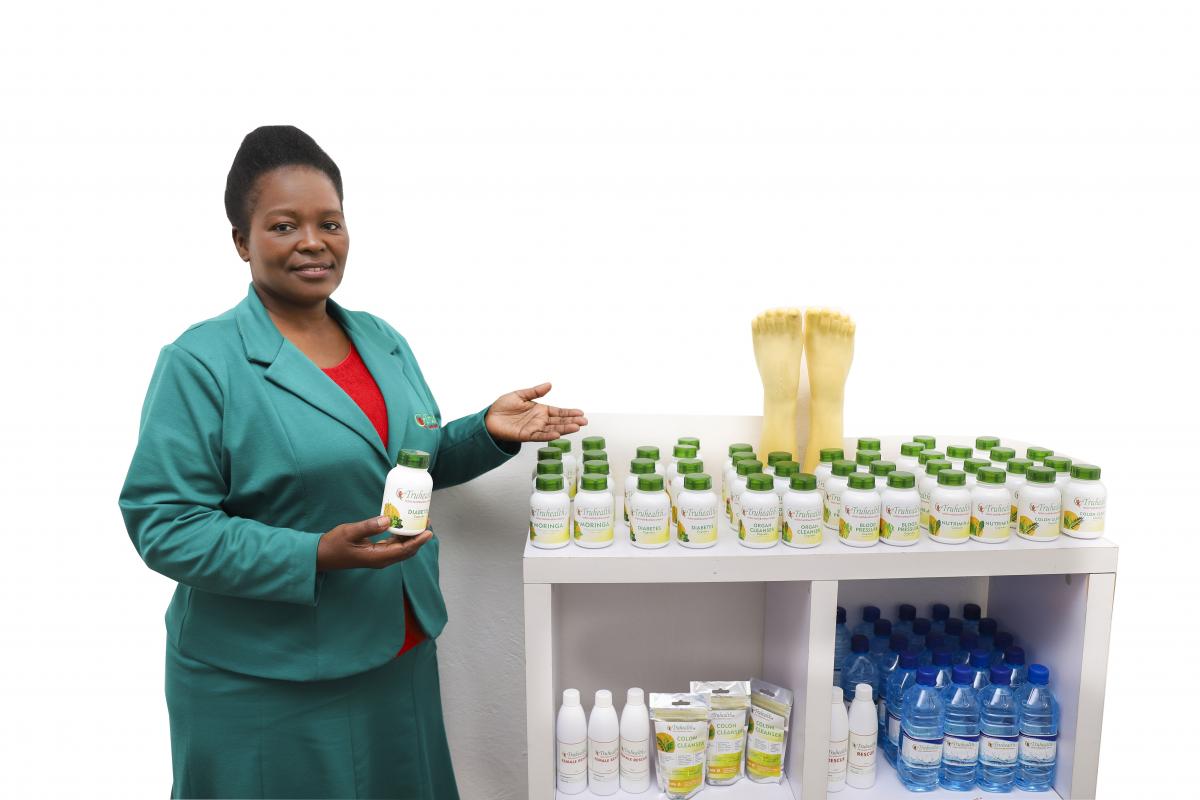 ), which is an entity of the Department of Agriculture and Rural Development. It aims to ensure a diverse, deracialised and sustainable agribusiness sector.
), which is an entity of the Department of Agriculture and Rural Development. It aims to ensure a diverse, deracialised and sustainable agribusiness sector.
She said the ADA helped get her products tested to meet safety standards for consumption, to trademark them and with marketing skills to expand distribution.
“The ADA has also afforded me an opportunity to attend training offered by the South African Bureau of Standards (SABS),” she said.
She now has four employees and runs a clinic that offers health and wellness services, including colon hydrotherapy, reflexology, spine alignment, foot care, massage, herbology, full body detoxification, diet and nutrition, among others.
“I opened this business after completing a qualification in Naturopathy in Original Medicine from the International Institute of Original Medicine in the United States of America,” she said.
Mahaye was inspired to consider naturopathic medicine as a career after learning that most of the sicknesses that trouble people can be cured using natural methods.
According to Mahaye, many of her patients’ health problems stem from a dirty colon, which is the result of unhealthy eating. She uses colon hydrotherapy to relieve their pain.
She said in some cases, once the colon is cleansed, other health problems such as piles, ulcers, allergies, skin problems, body odour, bad breath and many others are cured.
Body hydrotherapy, to boost the immune system, is another of the clinic’s services.
She said her company is able to provide various services to people of all ages including babies.
Mahaye added that should a problem be detected that requires conventional medical treatment, the patient will be referred to a medical doctor.
Contact the ADA at 033 347 8600 or email: info@ada-kzn.co.za.
Manufacturers who would like to get their products approved for certification by the SABS should call 0861 27 7227 or toll free 0800 00 7112 or email: info@sabs.co.za
Jobs: Department of Labour - Sep 2019
Jobs: Department of Labour - Sep 2019 angenithaBusiness Analyst: Chief Directorate: ICT, Head Office
Reference No: HR 4/19/09/11HO
Salary: All inclusive: R 733 257 per annum
Enquiries: Mr. E Nowosiad, Tel :( 012) 309 4990
Head Office: Chief Director: Human Resources Management, Private Bag X 117, Pretoria, 0001
Assistant Director: Media Production (Design Studio)
Centre: Directorate: Communications, Head Office
Reference No: HR 4/19/09/12HO
Salary: Commencing: R376 596 per annum
Enquiries: Ms. J De Wet, Tel: (012) 309 4635
Head Office: Chief Director: Human Resources Management, Private Bag X 117, Pretoria, 0001
Assistant Director: Inspection and Enforcement Services
Centre: Labour Centre: Port Elizabeth
Reference No: HR 4/4/1/403
Salary: Commencing: R 470 040 per annum
Enquiries: Ms A Bezuidenhout, Tel: (041) 501 5000
Provincial Office: Chief Director: Human Resource Management, Private Bag X 9005, East London ,5200
Assistant Director: Organisational Development
Directorate: Management Advisory Services, Head Office
Reference No: HR 4/19/09/13HO
Salary: Commencing: R 376 596 per annum
Enquiries: Ms. A Mcoso, Tel: (012) 309 4436
Provincial Office: Chief Director: Human Resources Management. Private Bag X 117, Pretoria, 0001
Assistant Director: COID (Re-advertisement, applicants who previously applied must re-apply)
Centre: Labour Centre: Modimolle
Reference No: HR 4/4/6/95
Salary: Commencing: R 470 040 per annum
Enquiries: Mr. GC Morebodi, Tel: (015) 290 1768
Provincial Office: Chief Director: Provincial Operations: Private Bag X 9368, Polokwane, 0700
Closing date for applications : 01 October 2019 | For full details of the advertised posts visit our website: www.labour.gov.za
Applications must be submitted on a Z83 form, obtainable from any Public Service Department or on the internet at www.gov.za/documents. The fully completed and signed form Z83( Section A and B Compulsory) should be accompanied by a recently updated, comprehensive CV as well as recently certified copies of all qualification(s), academic records including a Senior Certificate and ID-document [Driver’s license where applicable](Certified copy of a copy will not be accepted). The certification must be within three (3) months as at the advert closing date. Non-RSA Citizens/Permanent Resident Permit Holders must attach a copy of their Permanent Residence Permits to their applications. Should you be in possession of a foreign qualification, it must be accompanied by an evaluation certificate from the South African Qualification Authority (SAQA) including Matric. Applicants who do not comply with the above-mentioned requirements, as well as applications received late, will not be considered. The Department does not accept applications via fax or email. Failure to submit all the requested documents will result in the application not being considered. Correspondence will be limited to short-listed candidates only. If you have not been contacted within eight (8) weeks after the closing date of this advertisement, please accept that your application was unsuccessful. Suitable candidates will be subjected to a personnel suitability check (criminal record, citizenship, credit record checks, qualification verification and employment verification). Where applicable, candidates will be subjected to a skills/knowledge test. All shortlisted candidates for SMS posts will be subjected to a technical competency exercise that intends to test relevant technical elements of the job, the logistics of which be communicated by the Department. Following the interview and technical exercise, the selection panel will recommend candidates to attend generic managerial competencies using the mandated DPSA SMS competency assessment tools. Successful candidates will be appointed on a probation period of 12 months. The Department reserves the right not to make any appointment(s) to the above post. The successful candidate will be expected to sign a performance agreement. The Department of Labour is an equal opportunity affirmative action employer. The employment decision shall be informed by the Employment Equity Plan of the Department. It is the Department’s intention to promote equity (race, gender and disability) through the filling of this post(s) with a candidate whose transfer / promotion / appointment will promote representativity in line with the numerical targets as contained in our Employment Equity Plan.
Katlehong learners empowered with experiential training
Katlehong learners empowered with experiential training tsoanaLearners at Katlehong Engineering School of Specialisation in Ekurhuleni are being afforded an opportunity to acquire knowledge that will allow them to create jobs for themselves after completing Grade 12.
This is according to Gauteng Education MEC Panyaza Lesufi who recently unveiled the school, which will focus on transport, manufacturing and logistics.
Addressing learners, MEC Lesufi said the learners will be prepared for a life of entrepreneurship.
“You will now be taught things that will make you create jobs. We are empowering you with education that will turn the country around. Instead of being consumers, you are going to be manufacturers,” said the MEC.
The technical school has partnered with Samsung, amon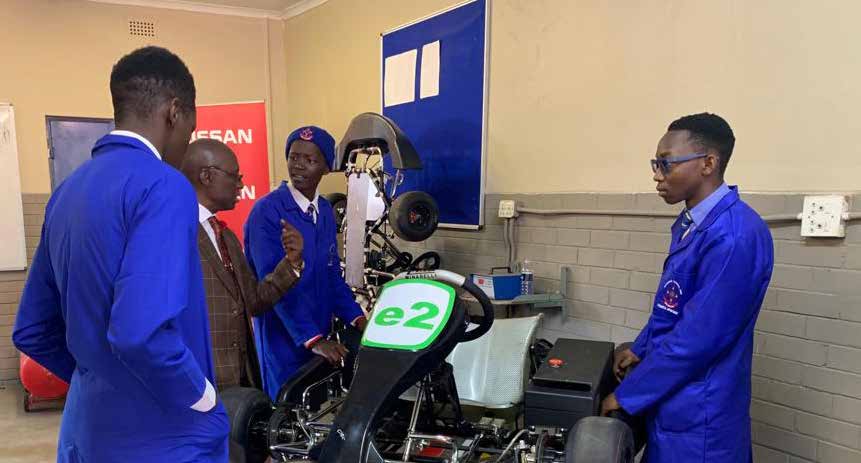 gst other companies. Samsung will take Grade 10-12 learners doing electrical technology to their academy in Midrand for additional training on a weekly basis.
gst other companies. Samsung will take Grade 10-12 learners doing electrical technology to their academy in Midrand for additional training on a weekly basis.
The Manufacturing, Engineering and Related Services Sector Education and Training Authority will assist 20 learners from the school who pass mathematics, technical mathematics and physical science to obtain their motor technician qualification at Ford, Volkswagen, Audi, Toyota or Mazda.
The MEC said the department’s partnership with the private sector has been fundamental in providing learners with workplace experience, learnership and artisanship opportunities, as well as entrepreneurial skills.
“Among other things, the companies we have partnered with will also support the school with training services and material.
“If we fail to change the education landscape, we will not succeed in empowering our children with the necessary skills to improve our economy,” said Lesufi.
One of the Grade 12 learners at the school, Lungile Mabuza, said learners need to be taught the relevant skills to help the country produce industry experts.
“Having an education like this will enable us to become leaders who come up with solutions. The ball is now in our court to choose if we want to be counted amongst those who have the education and the skills for the Fourth Industrial Revolution,” said Mabuza.
The school is one of eight schools of specialisation that the department has launched in the past three years with the aim of addressing the skills shortage and unemployment through public-private partnerships.
Lesufi said another 35 such schools would be built in Gauteng by 2022.
Ekurhuleni Executive Mayor Mzwandile Masina said the school is going to play a significant role in the development of the city and its youth.
Ekurhuleni is the manufacturing and logistics hub of the sub-Saharan economy. It contributes close to a quarter (23.3 percent) and close to a tenth (8.1 percent) to provincial and national Gross Domestic Product.
Kick-starting a child's future with a meal
Kick-starting a child's future with a meal angenithaBasic Education Deputy Minister Regina Mhaule has called on the private sector to collaborate with government in a bid to cast its net wider and feed more children.
The Minister made these remarks at the launch of the Department of Basic Education’s (DBE) National School Nutrition Programme (NSNP) at Winnie Mandela Primary School in Tembisa, Ekurhuleni, recently.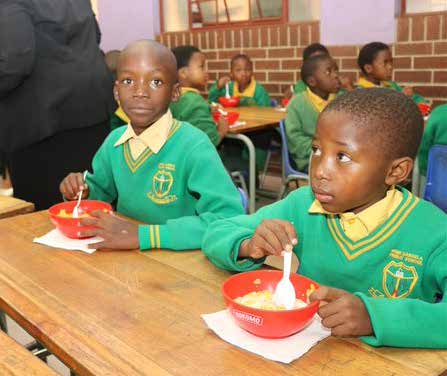
The launch is a product of a joint partnership between the DBE and South African food and beverage products company, Pioneer Foods.
“Education is a societal matter. We wish other partners would join in on this initiative. Through these partnerships, we will help learners to focus.
“If a child has breakfast, they perform better than those who did not, which means having breakfast is very important,” said the Deputy Minister.
The NSNP is a government programme that provides one nutritious meal to all learners in poorer primary and secondary schools.
The aim is to provide nutritious meals to learners and improve their ability to learn. The programme also teaches learners and parents how to lead a healthy lifestyle, and promotes the development of school vegetable gardens.
The launch of the programme at Winnie Mandela Primary makes Gauteng the seventh province that Pioneer Foods supplies with breakfast.
According to Pioneer Foods CEO Tertius Carstens, the foods and beverages company serves breakfast to about 35 000 children across the country.
“We are proud to make a contribution to the sustainable development goals of reducing hunger and poverty in our country.
“Feedback on this programme confirms that absenteeism has reduced and school performance has improved,” said Carstens.
The primary school started serving breakfast to its pupils from July.
School principal Solomon Simango said his school had already seen an improvement in the learners’ reading marks since the start of the programme.
“Learners also arrive on time to ensure they receive the breakfast, which is served from 7am until 7.20am. This has also reduced late coming,” said Simango.SAnews.gov.za
Mpumalanga’s farming transformation success story
Mpumalanga’s farming transformation success story Ursula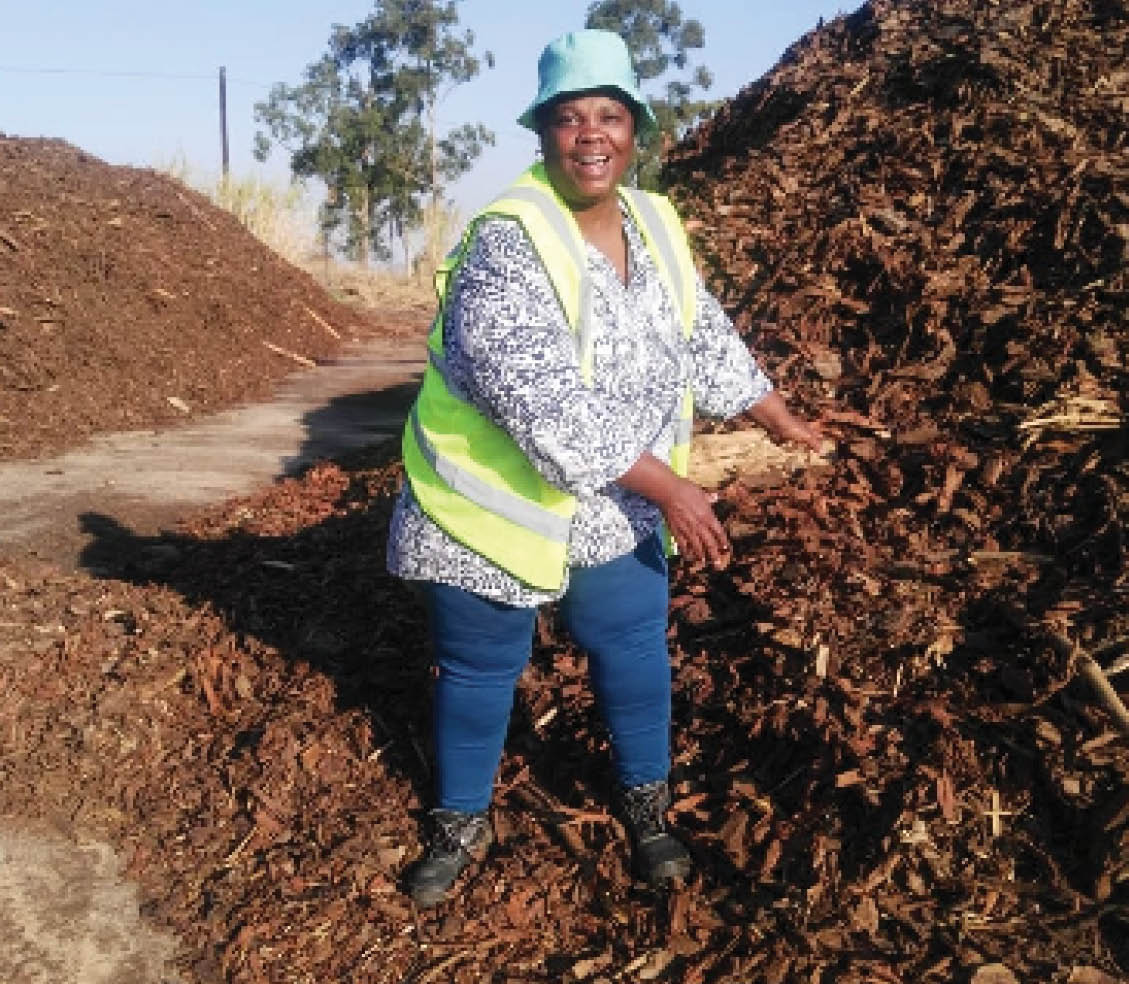 Farmer development programmes sponsored by government have enabled a farmer to not only develop her business, but to also upskill her 47 employees.
Farmer development programmes sponsored by government have enabled a farmer to not only develop her business, but to also upskill her 47 employees.
Owner of Matsino Farm, Thandi Mokoena (51), has made the most of the 700 hectare farm she received from the Department of Rural Development and Land Reform (DRDLR) in 2011.
In August, she won the Top Entrepreneur: Processing accolade in the Mpumalanga leg of the Department of Agriculture, Forestry and Fisheries’ (DAFF) Female Entrepreneur Awards and went on to represent the province in the national competition.
Although Daphne Neethling from the Western Cape took the ultimate honours, Mokoena’s performance showed just how successful a farmer she is, given that she has maintained the momentum created back in 2013 when she first won the regional leg of the DAFF awards.
Based in White River, Matsino Farm’s main area of enterprise is forestry, and involves mainly gum and eucalyptus trees. Operations include cutting, manually bucking, sorting and labelling, packing and loading timber for delivery to clients.
In addition, the farm raises livestock and produces organic manure. Mokoena’s livestock venture benefitted from DAFF support after she applied for and received 25 Bonsmara heifers and one bull.
A job as a farm worker at Komatiland Forests is what ignited Mokoena's passion for forestry and prompted her to start her own business.
Today, Matsino Farm’s timber operations has well-established clients, including Impala and Modikwa mines. Mokoena is currently in talks with Chinese officials and businesses and hopes to soon start exporting her timber products.
“The farm has helped me improve my life. It has also allowed me to assist in upskilling others,” she said, explaining that the Agricultural Sector Education Training Authority has assisted in ensuring her employees benefit from the relevant government training programmes.
On a personal level, she has seized a number of training opportunities. Through DAFF-funded learnerships, she travelled to China in 2015 and 2017 and Australia in 2015, 2017 and 2018. In addition, she completed a DAFF-funded business management course through Stellenbosch University.
For more information about the Department of Rural Development and Land Reform’s programmes, visit www.drdlr.gov.za or call 012 312 8911. For DAFF programmes, visit the website www.daff.gov.za or call 012 319 6000.
No to violence against women and children
No to violence against women and children BathandwaPresident Cyril Ramaphosa has heard the call by South Africans for emergency measures to end Gender-Based Violence and Femicide.
Over the past few days, our country has been deeply traumatised by acts of extreme violence perpetrated by men against women and children.
“These aacts of violence have made us doubt the very foundation of our democratic society, our commitment to human rights and human dignity, to equality, to peace and to justice,” said President Cyril Ramaphosa when he addressed the nation and again condemned Gender-Based Violence and Femicide (GBVF).
“Today, I speak to you as your President and as a citizen of our country. But I also speak to you as a husband and as a father to my daughters. Like millions of men across this country, I am appalled at the war being waged on our sisters, our mothers, our wives, our partners and our daughters,” he said.
“We know the names of Uyinene Mrwetyana, Leighandre Jegels, Janika Mallo, Ayakha Jiyane and her three little siblings, but we also grieve for many others who have died at the hands of men. These killings have caused great pain and outrage because acts of such brutality have become all too common in our communities. Violence against women has become more than a national crisis. It is a crime against our common humanity,” he added.
The President stressed that women have every right to expect that they be free from harassment and violence. “We have heard the calls of the women of our country for action and for justice. The collective anger, the pain and the fear that these killings have caused must strengthen our resolve to end all forms of violence and abuse perpetrated by men against women,” he said.
Fighting GBV
The President said that the national register of GBV offenders, provided for in the Sexual Offences Act, will be overhauled and modernised.
“It will list all the men convicted of acts of violence against women and children. I will ask Parliament to consider amending legislation to make the register public.
“I will propose to Cabinet that all crimes against women and children should attract harsher minimum sentences. We agree with the women of our country that the state should oppose bail and parole for perpetrators of rape and murder against women and children,” the President said.
Many women’s organisations have raised concerns that there aren’t enough rehabilitation programmes in prisons. “These programmes will be increased and reconfigured to reduce the number of repeat offenders,” the President confirmed. In addition, the President stressed that all GBV cases that were closed or not properly investigated must be reviewed.
“We will strengthen emergency teams at a provincial level – which bring together the police, social development, health, justice and education – to continue providing rapid and comprehensive responses to all forms of violence against women,” the President said. These teams will focus in particular on violence directed at women, children and other marginalised groups, including the LGBTQIA Plus community and people with disabilities.
The President said that other systemic challenges, such as the backlog of cases, delays in DNA testing and the availability of rape test kits in our police stations will also be addressed. He said every means at the state’s disposal will be used to strengthen the national response to GBV; and a national multi-faceted plan to prevent GBV through school programmes, community initiatives and workplace policies will be implemented.
“The Minister of Finance will be asked to allocate additional funding to the national machinery to co-ordinate the campaign against GBV,” he added.
Progress has been made in implementing the decisions taken at last year’s Presidential Summit on GBV, including reviewing the laws on domestic violence and sexual offences to prioritise survivors’ interests and needs. In addition, since 2013, 92 dedicated Sexual Offences Courts have been established. Another 11 will be opened this financial year.
Men must speak out
“Violence against women is not a women’s problem. It is not a problem of what a woman said or did, what a woman was wearing or where she was walking. Violence against women is a men’s problem.
“It is men who rape and kill women. There is therefore an obligation on the men of this country to act to end such behaviour and such crimes. As men, let us speak out. We must not look away. We must face GBV head-on. Let us, as families, make sure that we raise boys to respect women, to respect themselves, to value life and human dignity,” the President said.
“As South African men, let us take responsibility for our actions… Let us declare
that enough is enough,” he added.
Report Abuse
Reporting abuse can save a life. Government is urging all communities and victims of any form of abuse to report such cases to law enforcement officers or use any of the following hotline numbers: Callers may remain anonymous and all information will be treated with the strictest confidence.
• SAPS Crime Stop: 08600 10 111
• SMS Crime Line: 32211
• Department of Social Development 24-hour Command Centre: 0800 428 428 (toll-free) – callers can speak to a social worker for assistance and counselling
• Callers can also request a social worker from the Command Centre to contact them by dialling *120*7867# (free) from any cell phone.
• Child Welfare South Africa: 0861 424453 / 011 452-4110 / email:info@childwelfaresa.org.za
• Child Line – 08000 55 555 (toll-free)
North West citrus farm enters global market
North West citrus farm enters global market UrsulaEmerging farmers are claiming a segment of the juicy citrus export market after receiving funding and support from the North West government.
Family-run co-operative Batlhako Temo Services has become a leading citrus producer in the North West.
The agricultural project was established in 2012 by members of a Brits family that today leases 61.5 hectares of land from the now North West Department of Agriculture and Rural Development.
One of the five members of the co-operative, Issac Moilwa, said they initially grew sunflowers but after two years decided to diversify into citrus.
Today, Batlhako Temo Services is the first black-owned citrus producer in the province to enter the global market, with its produce heading for the Middle East and Taiwan.
“Our success is made possible by the support we get from the department,” Moilwa explained, adding that the department provided R1 600 000 in funding between 2014 and 2017.
“We used the funds to improve our irrigation system and to structure our office space and logistics.
“We have also been receiving technical advice from the department and we have managed to increase production because of that,” he added.
The co-operative is part of the Citrus Growers Association, which generally supports its members to be globally competitive.
To date, the co-operative has employed 10 permanent workers and over 70 seasonal workers. It has 16 000 citrus trees.
Apart from its export contracts, the co-operative also supplies local companies.
Moilwa said there are still challenges facing the co-operative, such as not having its own pack house.
“A pack house will cut a lot of costs and eventually lead to us employing possibly over 200 people. We would like to make a greater contribution to job creation,” he said.
North West Agriculture and Rural Development MEC Desbo Mohono has encouraged the co-operative to work even harder and grow its global market. "I would like to see more farmers expanding their territories," she said.
Official SADC status for Kiswahili
Official SADC status for Kiswahili UrsulaThe Southern African Development Community (SADC) has adopted Kiswahili as its fourth official language of communication, alongside English, Portuguese and French.
The decision was announced during the SADC 39th Summit of Heads of State and Government which was recently held in Tanzania, at the Julius Nyerere International Convention Centre.
The timing could not have been better, with the world celebrating the International Year of Indigenous Languages (IYIL) in 2019.
Kiswahili’s status as the first indigenous language to be officially adopted by the regional bloc is a positive step towards ensuring that the marginalisation of African languages as languages of business is dealt with.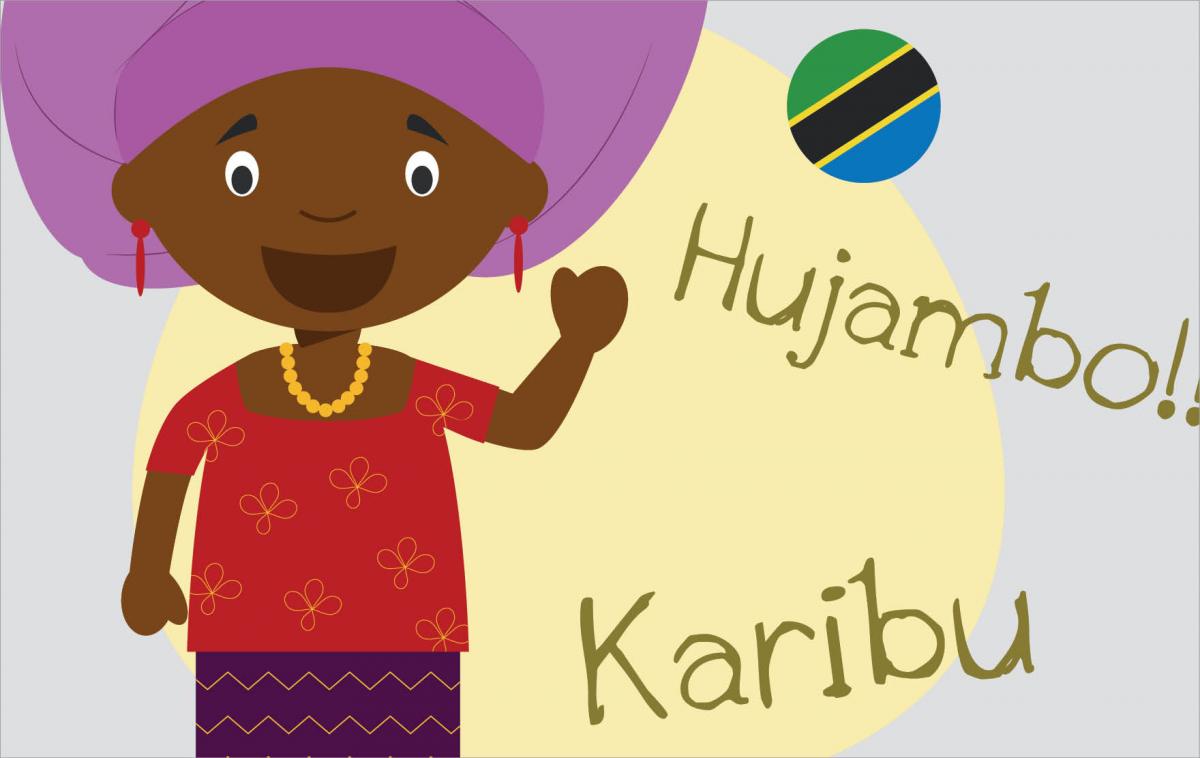
One of the most widely spoken languages on the African continent, Kiswahili is already an official language of the African Union.
SADC said the move is in line with the General Assembly of the United Nation’s declaration of 2019 as IYIL, as per the resolution of the UN Permanent Forum on Indigenous Issues (Resolution 71/178).
The Pan South African Language Board (PanSALB) has welcomed the declaration. PanSALB was established by the national legislation with the exclusive mandate to promote, and create conditions for the development and use of, all official languages of the Republic of South Africa; the Khoi, Nama and San languages and sign language.
PanSALB chairperson Dr David Maahlamela said: “This milestone achievement towards recognition and elevation of indigenous African languages across the SADC region forms part of the greater effort in ensuring development, usage and intellectualisation of our heritage languages.
“We have for long been very much concerned that not only South Africa has experienced the marginalisation of indigenous languages, but also our SADC region, where mostly English took prominence. South Africa as a member state has a huge responsibility ahead in ensuring that indigenous languages not only become communication languages, but also business languages in all sectors and environments,” said Dr Maahlamela.
President Ramaphosa calls for calm
President Ramaphosa calls for calm BathandwaPresident Cyril Ramaphosa has called on South Africans to desist from fuelling tensions in the wake of violence that has gripped the country.“I am calling upon each one of us to desist from fuelling a climate of fear and confusion,” said the President.
President Ramaphosa addressed the nation recently through a national broadcast on radio and television on matters of public violence and gender-based violence.
President said the country has been deeply traumatised by acts of violence and criminality directed against foreign nationals and South African citizens.
“We know that at least 10 people have been killed in this violence, two of whom were a foreign nationals. No amount of anger and frustration and grievance can justify such acts of destruction and criminality.
“There can be no excuse for the attacks on the homes and businesses of foreign nationals, just as there can be no excuse for xenophobia or any other form of intolerance,” he said.
Equally, President Ramaphosa stressed that there is no justification for the looting and destruction of businesses owned by South Africans.
“The people from other countries on our continent stood with us in our struggle against apartheid.
“We worked together to destroy apartheid and overcome the divisions it created, where we feared each other and our differences were exploited,” he said.
The President called on South Africans to work to strengthen political, social and trade ties in an effort to develop the country’s economy and that of its neighbours.
He also called on communities with genuine grievances to address these through engagement and dialogue.
In the same breathe, the President warned that no stone would be left unturned in addressing criminal activity.
The President commended law enforcement and security agencies for their swift action to restore stability in Johannesburg, Ekurhuleni, Tshwane and parts of KwaZulu-Natal.
“The criminal justice system is ready to deal with perpetrators of violence, looting and lawlessness,” said President Ramaphosa.
Calling for calm, President Ramaphosa said this was time for all who live in the country to confront challenges directly and earnestly, not through violence, but through dialogue. SAnews.gov.za
Register online for contractual employment at Stats SA
Register online for contractual employment at Stats SA vuyelwanStatistics South Africa (Stats SA) has reopened registration for contract employment on the recruitment database for prospective candidates.
Stats SA said the recruitment database was reopened due to low registration in several areas where candidates are required.
“Several areas across the country have been sampled for the Census 2021 Mini Test which is scheduled to start in October this year and people who reside in those areas are invited to apply for fieldwork opportunities,” Stats SA explained.
List of areas
|
PROVINCE |
SAMPLED AREA |
|
Eastern Cape |
Buffalo City (Eluxolweni, Mdantsane, Sandisiwe, East London, Cuba A,Cuba B) |
|
Free State |
Bloemfontein (Mangaung), |
|
Gauteng |
Ekurhuleni (Edenvale, Tembisa, Germiston, Kempton Park) |
|
KwaZulu-Natal |
Imbali, Pietermaritzburg, Phayipini (The Msunduzi) |
|
Limpopo |
Polokwane (GaThoka, Mankweng, Tweefontein), |
|
Mpumalanga |
Emalahleni (KwaGuqa) |
|
Northern Cape |
Kimberley (Sol Plaatjie), |
|
North West |
Rustenburg (Wildebeesfontein, Freedom Park ) |
|
Western Cape |
Goodwood, Athlone, Langa, Cape Town |
How to register
To register for contract employment, prospective candidates should go to the Stats SA website at www.statssa.gov.za and register online.
On the website, you need to click on ‘About Us’, go to vacancies, and then register or update your profile on the link provided.
“The youth are encouraged to apply in order to learn and gain valuable experience in the data environment. Registration is open until 15 September 2019 and it is free of charge,” Stats SA said.
Requirements
For your application to be considered, you must:
- Have a minimum of a Senior Certificate (Matric or equivalent)
- Be proficient in any of the 11 official languages
- Be willing to work over weekends and outside of normal office hours
- Be an RSA citizen with no criminal record.
Applicants are also advised to attach proof of residence (e.g. municipality rates bill, clothing account statements, tribal authority letter, affidavit, etc.).
“Any registration without the above-mentioned supporting document will be regarded as incomplete and the applicant will not be able to complete the registration on the database,” said Stats SA.
For enquiries, applicants can contact the officials below:
Lehlohonolo Dooka - 082 907 4952
Nontokeko Bongobi - 079 009 9142
Sarah Khoza - 012 310 8097
Mantwa Montsho - 083 680 3845
Security cluster moves to stabilise areas
Security cluster moves to stabilise areas vuyelwanDefence and Military Veterans Minister Nosiviwe Mapisa-Nqakula says government has moved to restore stability in areas where incidents of public violence flared up over the past week.
The Minister also sent a stern warning to those who undermine the rule of law, saying they will be met with severe consequences.
She said this when Ministers in the Justice, Crime Prevention and Security (JCPS) Cluster briefed the media on progress that has been made in addressing incidents of public violence that saw shops being looted in Gauteng’s metro cities – Johannesburg, Tshwane and Ekurhuleni – and KwaZulu-Natal.
“The JCPS Cluster has moved swiftly to restore peace and stability in Johannesburg, Ekurhuleni and Tshwane CBDs as well as in KwaZulu-Natal. 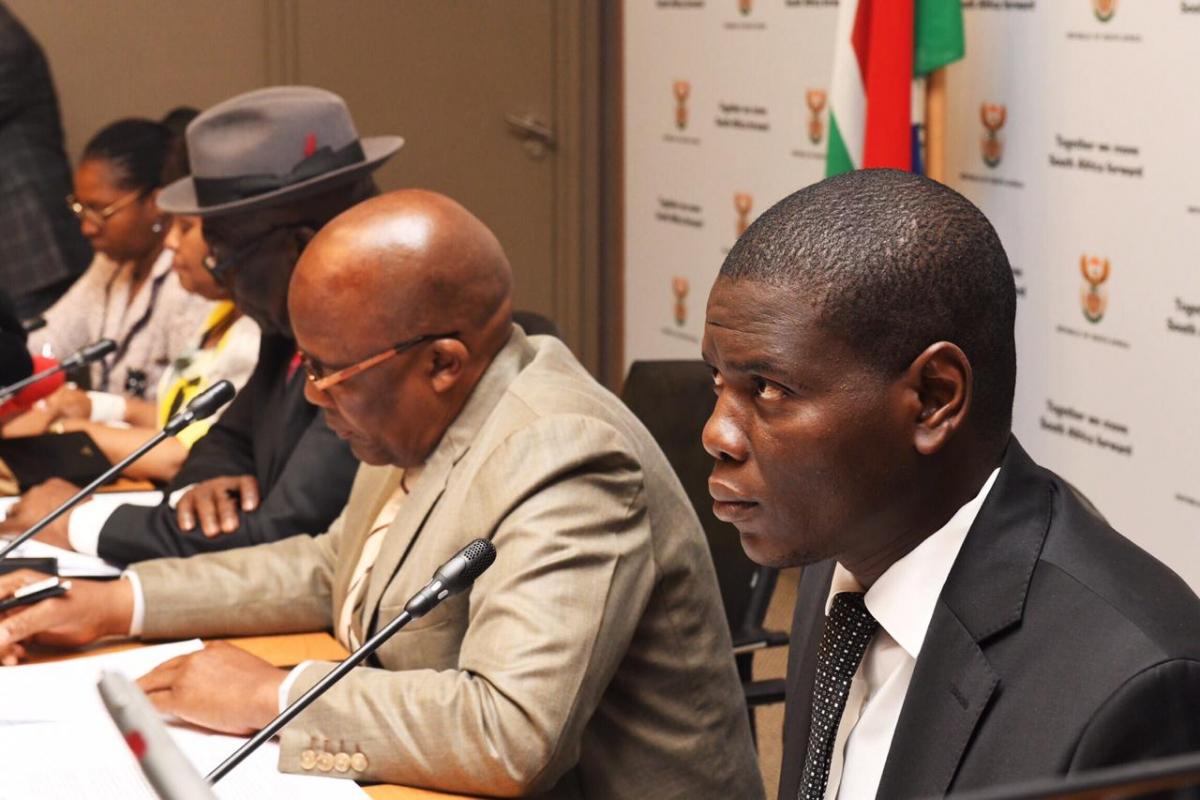
“Law enforcement will ensure that the authority of the state is not undermined. Any attempt to undermine the authority of the State will be met with severe consequences. An attack on law enforcement authorities is an attack on the State.”
The Minister said while there has been a significant decline in the number of incidents, police forces remain on high alert and are closely monitoring all hotspots to ensure that further violence does not erupt.
“We have noted with concern that the incidents of lawlessness have been characterised as xenophobic attacks. The evidence presented to the JCPS Cluster has not shown that foreign nationals are being targeted because of their nationality. On the contrary we are seeing acts of criminality.
“Whoever is found on the wrong side of the law will be dealt with accordingly. South Africa is not a xenophobic country,” said the Minister.
Tuesday’s briefing comes after a difficult past couple of days that saw shops being looted and other burnt and several foreign nationals being attacked, with some being forced to take refuge at police stations.
“There will be continuous joint inspections by the different law enforcement agencies countrywide to ensure compliance with the laws of the country,” she said.
700 arrested, 12 deaths
The Minister said close to 700 suspects have been arrested in connection with the violent protests that flared up in Gauteng - some as early as the night of 1 September in Central Johannesburg.
The charges for the arrested suspects ranged from public violence, arson, malicious damage to property, theft and possession of stolen property, possession of unlicensed firearms and ammunition, attempted murder and murder, business robbery, and contravention of the Gatherings Act.
The Minister said there is dialogue with communities living around these areas.
Crime Intelligence has been providing ongoing operational support through the submission of early warning reports at both provincial and national level. Mapisa-Nqakula said this has helped in the containment of planned acts of violence before they can take place.
“Incidents of violence flared up but [were] quickly dealt with by police around Jeppestown and Hillbrow.
“Two people died on Sunday bringing the total amount of fatalities to 12, ten of which are South Africans and two are foreign nationals.”
The Minister said, meanwhile, government is monitoring the situation and the provision of early warning intelligence is ongoing to assist with the stabilisation and normalisation of the current situation.
She also said that assistance was also being provided in the identification of suspects resulting in speedy arrests.
“With regards to intelligence services, we want to assure members of the public that the intelligence agencies are working day and night to detect and prevent the occurrence of these violent incidents and a lot of these have been nipped in the bud across various locations in the affected areas.”
She said intelligence-driven investigations are ongoing to identify suspects and ring leaders.– SAnews.gov.za
Setswana brings joy to writer’s heart
Setswana brings joy to writer’s heart angenithaFikile Moiloa started writing as a way to express how she feels.
Her first work was in English, but with time, she felt that English was restricting her and resorted to writing in Setswana.
Moiloa said she had never dreamt of being a published writer but in 2013, a friend planted the idea in her mind.
“I would write and send her my work and she would print and save it. When she came to me with the idea of publishing a book, I thought it was impossible – but the seed had been planted.” 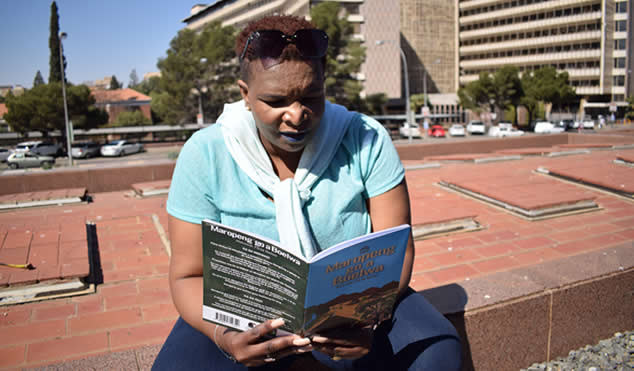
A Free State resident, she said many people advised her not to write in Setswana, saying her books would not sell in the province. They advocated either Sesotho or English. But Setswana spoke the language of her soul and she pressed on.
By the time she eventually had an opportunity to publish her first book, Mo-Afrika go iri jang?, she had a selection of over 40 Setswana poems from which to choose.
“My first book did really well and it gave me the confidence to continue publishing, because it sold to 300 libraries in the Free State alone, excluding private buyers.
“I didn’t change to other languages because Setswana allows me to best express myself and writing is an outlet for my feelings.”
Moiloa recently published her novel, Maropeng Go a Boelwa. “The book was inspired by a past incident when I was nearly raped by a family friend. It’s worrying how rape has become a norm in our society. The book is my way of helping rape victims and victims of assault to speak out.”
Known as MoAfrika in the literature circles of the Free State, Moiloa’s mother is Zulu, her father is Xhosa and she is married to a Sotho man. She is fluent in six African languages.
Two of her biggest achievements are running MoAfika go iri jang All-purpose Cultural Club and coming third in the Avbob Poetry Competition in 2018.
Violent attacks have no place in South Africa
Violent attacks have no place in South Africa vuyelwanWhat will people say?
What will people say? vuyelwan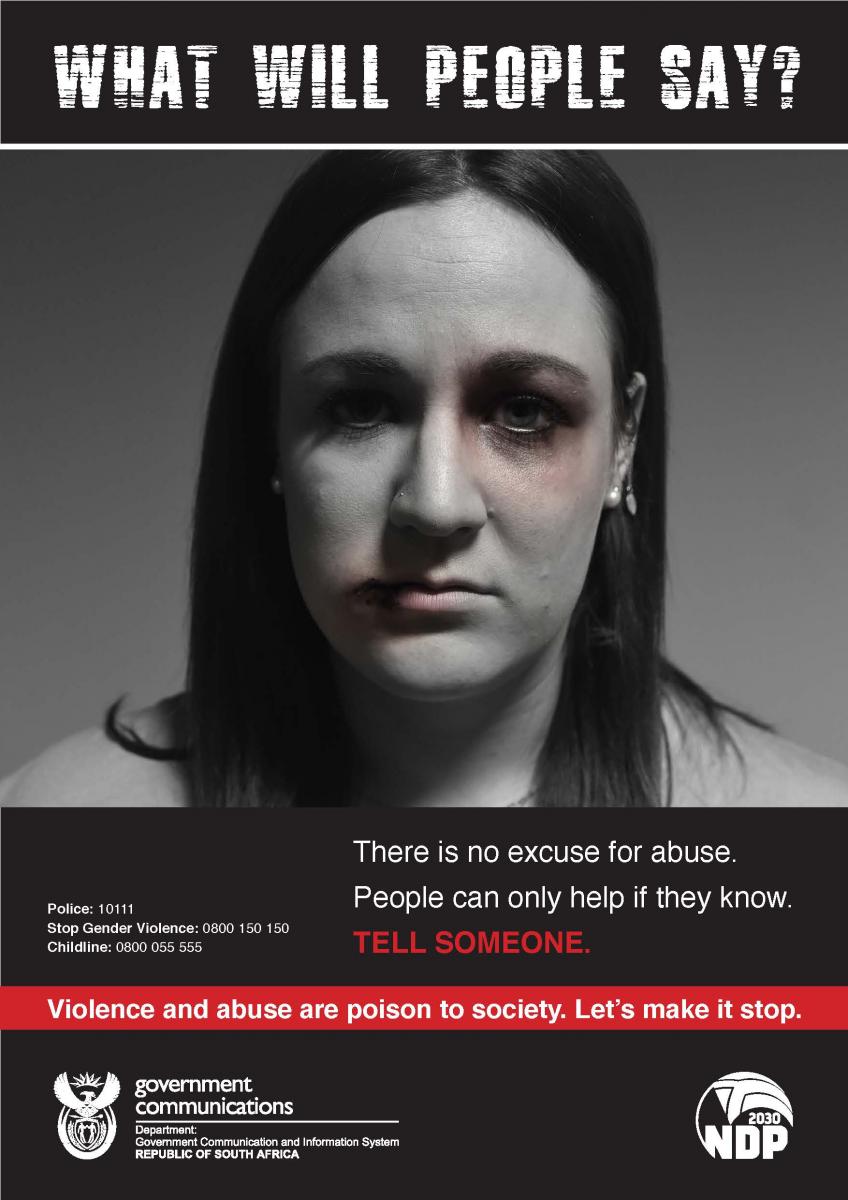
Women making moves in the construction industry
Women making moves in the construction industry UrsulaThe construction industry has for a long time been perceived as the domain of men but thanks to pioneering women and organisations such as South African Women in Construction (SAWIC), this perception is being challenged.
SAWIC is a non-profit organisation that was established in 1999 to empower women to gain access to business opportunities, training, finance and networks in the construction industry.
The nationwide organisation has worked very closely with various government departments and entities over the years, including Human Settlements, Public Works and state-owned enterprises, to promote, support and uplift women in the sector.
One woman who has benefitted from the initiative is Keamogetswe Kuypers (37), who is the owner of Tshegadi Services, which specialises in general building and civil engineering.
“I gained most of my experience through a co-operative called Lentsoe Labasadi, which I found through SAWIC in 2016,” she said, explaining that the SAWIC model encourages various women-owned co-operatives to work together on construction projects, by subcontracting into a job. “In that way, the organisation is able to teach and develop many women at once.”
After gaining suitable experience, Kuypers started Tshegadi Services.
Kuypers grew up in Soweto and studied a BCom in Accounting at Rhodes University in the Eastern Cape. She also has a BCom Hons in Taxation from the University of Johannesburg.
Before embarking on her entrepreneurial journey, she worked for various multinationals and local companies in the mining, food and beverages, consulting, manufacturing and automotive sectors.
Amongst the things that motivated her to start a construction company is the need for low-cost housing.
“I am hoping that we can design houses that are easy to extend while relieving the public purse and reducing lead times,” she said.
In March, Kuypers was elected as the Provincial Treasurer of SAWIC in Gauteng.
One of her aims is to address gender equality in construction and other male-dominated sectors. “Partnering with men and teaching them about labour inequality, especially unpaid labour and how it affects women at home and in the workplace, is the only way to achieve equality,” she said.
For Kuypers, equality means an appreciation of the skill set you bring to an environment without being expected to do unpaid labour as a result of your gender.
Youth are playing their part in protecting tourists
Youth are playing their part in protecting tourists UrsulaA tourism safety initiative gives training and employment to unemployed youngsters while also improving the tourist experience in South Africa.
The Northern Cape Department of Economic Development and Tourism has given jobs to 51 previously unemployed young people, who have been trained as tourism monitors and placed at tourism hotspots around the province.
The initiative is the province’s leg of the National Tourism Monitors Programme. Launched in 2017, the programme seeks to create a safer, better experience for tourists, by training youth and placing them in paid positions for a 12-month period. This is in recognition of the fact that crime is a major threat to tourism in South Africa. The programme falls under the broader Expanded Public Works Programme.
Each participant of the Tourism Monitors Programme receives a stipend and a uniform. Their duties include providing information to visitors at tourist sites; patrolling within identified areas and reporting crime incidents to the SAPS and other relevant enforcement agencies.
The youth took part in an intensive three-week training programme, which included customer service, security and safety training.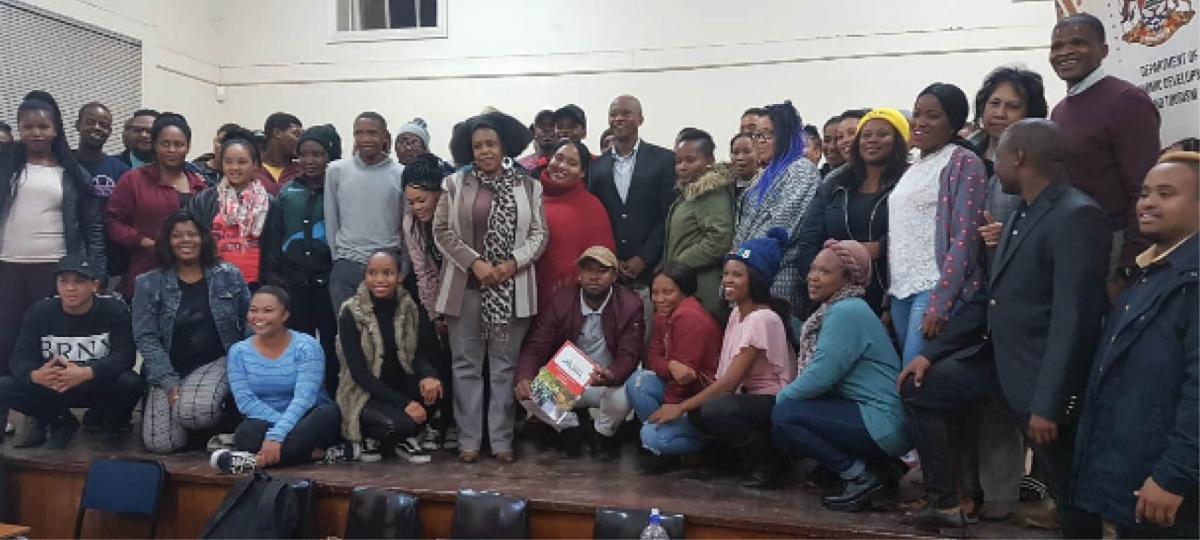
Maruping Lekwene, Northern Cape MEC for Economic Development and Tourism, said the tourism industry has been identified as an excellent channel for addressing poverty and unemployment, especially amongst the youth.
“What is key for the province and for me as MEC is the upskilling and reskilling of our young people.”
The 51 youth have been placed at 15 popular tourist attractions in all five districts of the province. One of the tourism monitors, Bontleeng Choche from Kuruman, said it is exciting for her to have an opportunity to be employed in the tourism industry.
“I am very happy about this opportunity to have a job and be able to earn an income," said Choche.
Minister of Tourism Mmamoloko Kubayi-Ngubane said that tourism safety is an important priority for national government.
“Incidents of crime directed at tourists and tourism products create a negative perception and reputation about a destination and, in turn, impact both the visitor experience and visitor numbers. Tourism has been working with various stakeholders to compile a safety plan, of which the Tourism Monitors Programme forms part of.”
Youth in Mtubatuba roll up their sleeves to fight poverty
Youth in Mtubatuba roll up their sleeves to fight poverty UrsulaAco-operative run by a group of young people in Mtubatuba in northern KwaZulu-Natal has the potential to create jobs for locals and to boost the community’s economy.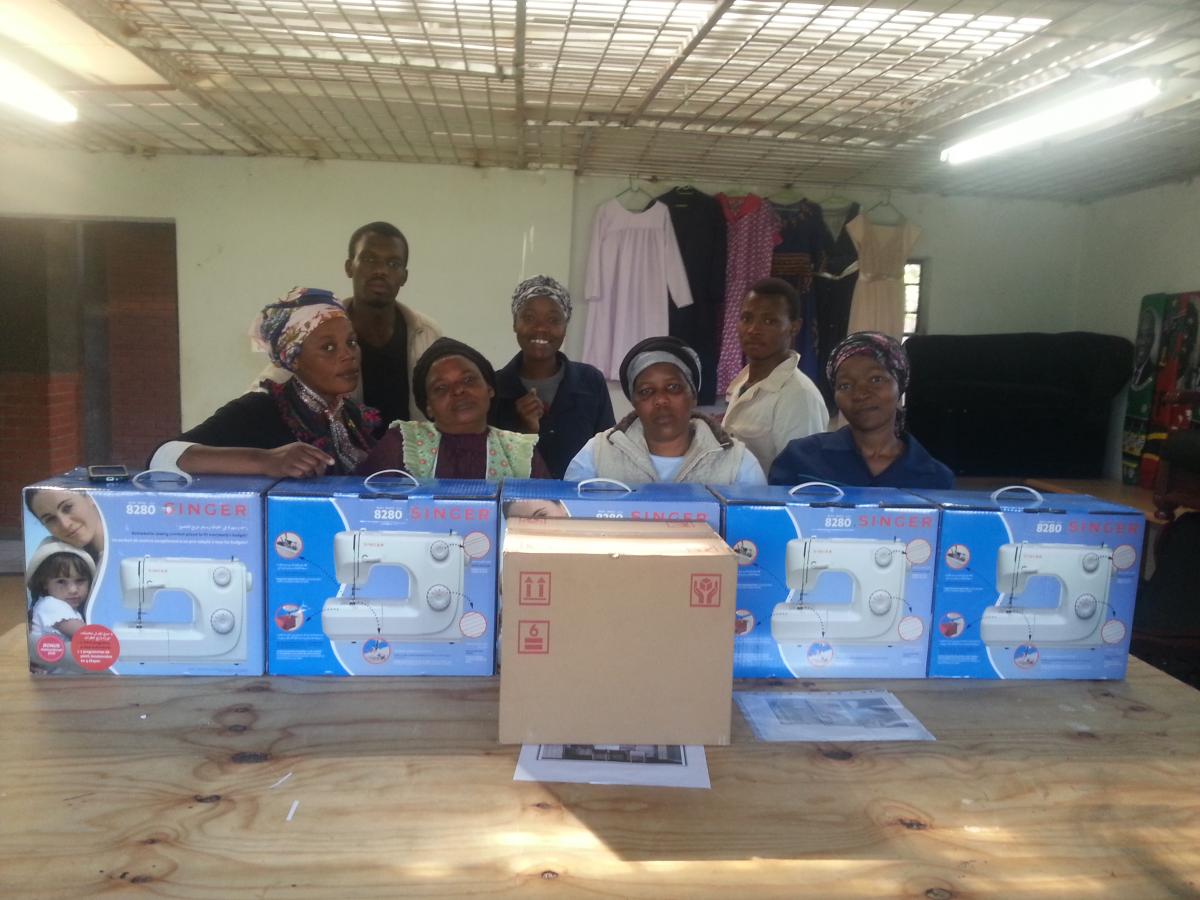
Janitor Co-operative – which has eight members, most of whom are women – manufactures furniture and clothing.
It was established in 2015 by four young people from Mtubatuba who had seized the opportunity for free community development training that was offered by a local private institution.
Janitor Co-operative Manager Thandiwe Kunene (27) said the co-founders were previously members of separate co-operatives that were not faring well.
“After the training, we decided to come together to form one co-operative and called it ‘Janitor’, which basically means a caretaker. We had the same vision and dream, which is to make a success of our community by striving to create jobs and opportunities for young people, especially those who have completed school but are struggling to get jobs,” said Kunene.
She said all the members of the co-operatives struggled to find sustainable jobs after completing their studies, which is a problem that many young people in their community experience.
In the space of four years, the co-operative has doubled and the members hope it keeps growing.
“Right now, we have eight employees, six of whom are women,” she said.
Recently, the co-operative received five domestic sewing machines and an over-locker from the KwaZulu-Natal Finance MEC Ravi Pillay.
The MEC’s donation formed part of Women’s Month celebrations and was prompted by the high levels of unemployment and poverty identified in the Mtubatuba area.
“Our old machines are almost worn-out and we were starting to experience challenges in finalising products on time,” said Kunene in response to the donation. “These new machines will help us meet our deadlines and produce better work.
“This donation is a necessary intervention to assist these young people who create employment opportunities for themselves and whose initiative helps uplift the local economy,” the MEC said.
Pillay used the opportunity to encourage a culture of entrepreneurship among the youth in the area.
He said the province is committed to encouraging economic development, creating jobs, promoting entrepreneurship and creating a conducive environment for investment.

